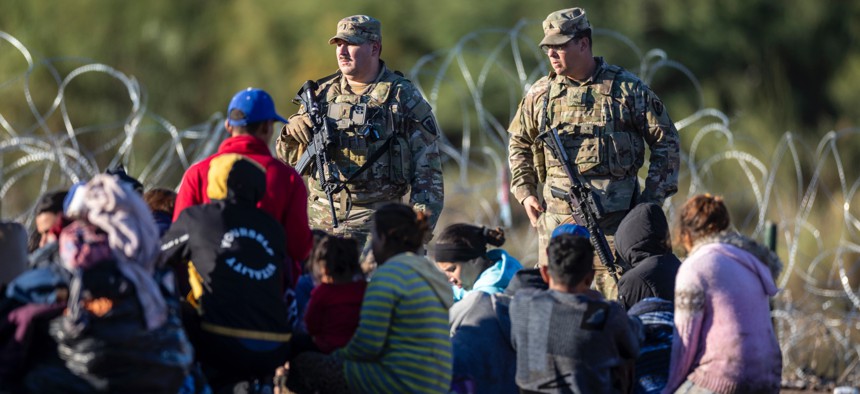
Texas National Guard troops watch over some of more than 1,000 immigrants who had crossed the Rio Grande overnight from Mexico on Dec. 18, 2023 in Eagle Pass, Texas. John Moore / Getty Images
With congressional deal elusive, Biden administration ramps up border closures
DHS will reassign officers to assist Border Patrol in taking migrants into custody.
Two international railway crossings between the United States and Mexico closed on Monday as the Biden administration scrambles to detain and process record numbers of migrants arriving at the border.
The announcement comes as the White House is engaging with Senate Republicans on a plan to tighten immigration policy and ramp up border security, though the two sides have yet to reach a deal. The Biden administration has pushed for significant new resources in several components of the Homeland Security Department and other agencies to boost staffing levels throughout the immigration system.
The railway closures at bridges in Eagle Pass and El Paso, Texas, followed the recent suspension of vehicular process at an international bridge Eagle Pass, operations at San Ysidro Pedestrian West in San Diego and the port of entry in Lukeville, Ariz. Customs and Border Protection said the train crossing closures in Texas would allow the agency to redirect personnel to assist Border Patrol in taking migrants into custody.
“We continue to adjust our operational plans to maximize enforcement efforts against those noncitizens who do not use lawful pathways or processes such as [the] CBP One [app] and those without a legal basis to remain in the United States,” CBP said.
A spokesperson for CBP declined to detail where or how the newly freed up agents will assist. The agency said smugglers are providing disinformation to migrants and have led a resurgence of individuals moving through freight trains.
CBP’s encounters have largely trended up since the summer, though they dipped slightly to 309,000 in October. In some areas, such as Arizona, migrants are crossing into the country at or near unprecedented rates. Border Patrol in Tucson has apprehended more than 18,000 migrants in each of the first two weeks of December. That far outpaces the same period last year, when Border Patrol encountered just 22,000 migrants in the entire month.
In Congress, a bipartisan group of lawmakers is working with the White House on a plan its proponents say would reduce the flow of migrants and provide border personnel with additional resources to supplement their efforts. Many aspects of the federal immigration system, ranging from CBP detention to asylum processing, are facing capacity shortfalls and overwhelmed workforces.
As part of the deal, the Biden administration is seeking $13.6 billion to hire nearly 6,000 immigration and border security-related employees at DHS and the Justice Department. The White House is looking to pair that funding with supplemental aid to Ukraine, Israel and Taiwan, though Republicans have insisted more restrictive immigration policy changes must accompany any such package.
Key negotiators have expressed some optimism in recent days that a deal could be reached, but it appears that any such agreement would not come until the new year. Areas of continued contention include reforms to the asylum process, limitations on legal immigration pathways such as parole and increased capacity for DHS officials to immediately turn away migrants as they did throughout the pandemic. Even if they struck a deal, members of both parties have denounced the preliminary parameters for being either overly restrictive or insufficiently severe.
House Republicans have insisted any deal that includes Ukraine funding restrict access to asylum, add additional detention facilities, bring back family detention, increase penalties for those who violate immigration laws, limit parole programs and reinstitute wall construction.







